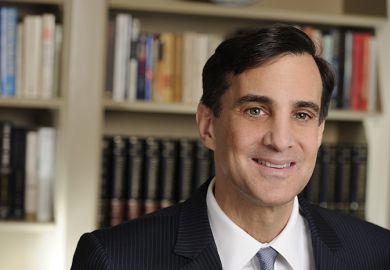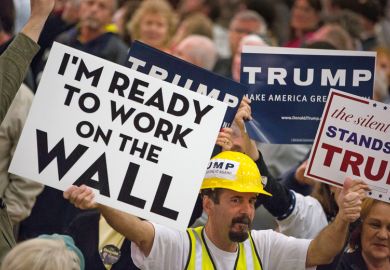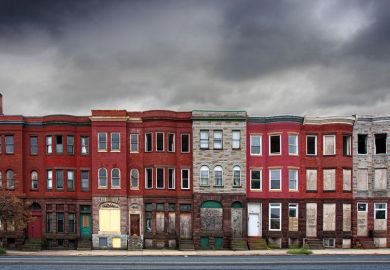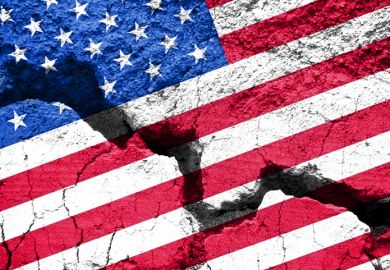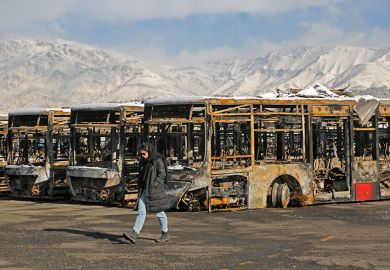Ron Daniels has had senior leadership roles within universities for 25 years, but it was only four years ago that he had an encounter that made him realise the sector was failing in a crucial area.
New students at Johns Hopkins University had just had an introductory session on university culture and Daniels, president of the institution, sat with them and asked how the day had gone.
“One of the students looked at me and said, ‘I never knew.’” They told him they had never been exposed to the idea of academic freedom, the case for free speech, the importance of contesting ideas, and why those things are essential for democracy.
“That was the ‘aha’ moment, which then caused me to pivot to really focus more generally on how well we were doing in equipping students for democracy,” he says.
Now Daniels is realigning the institution he has led for 12 years to become a bulwark for democracy, a calling he thinks all universities in democratic societies should take up urgently.
Critical juncture
“It's a truly remarkable thing, when you think of the march of human history, how unusual it is to be able to create and sustain democratic states,” he says. For Daniels, it is also astonishing, particularly “now we’re increasingly seeing how fragile it is”, that education on democracy is so scant.
“If they don’t get it in high school, and if we don’t provide this to our students...how can that do anything but impair their capacity to be informed and effective citizens?” he asks.
Free speech and academic freedom have been inherent to the idea of the university since it was formulated, according to Daniels, and with their additional, inbuilt mechanisms to enhance social mobility and foster civic duty, universities are in a unique position to strengthen democracy, he believes. In his new book, What Universities Owe Democracy, published last month, Daniels describes a “democratic recession”, pointing out that in 1996 more than a quarter of the world’s population lived in countries that were democratising, but by 2020 the figure had plummeted to 5 per cent.
Now, he claims, nearly 30 per cent – or 2.6 billion people – live in countries that are becoming more autocratic. We are, Daniels says, at a critical juncture in the story of democracy. If we do not act now, the arc will continue bending in the wrong direction.
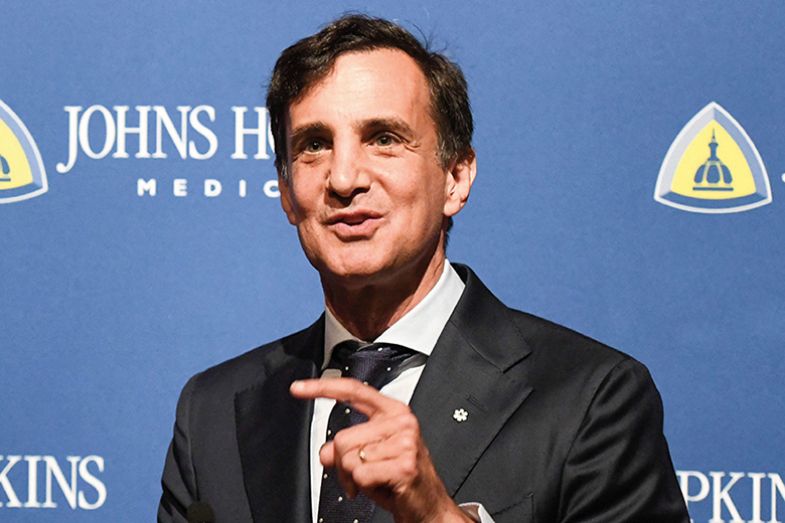
Change in attitude
Some might see a danger in a university president’s highlighting his students’ lack of engagement with freedom of speech in the context of recent attacks on universities regarding this issue, particularly in the US and the UK. Daniels’ response is robust. It is his responsibility as a university leader to advocate for and defend his organisation, he says, but also to be alert to the criticisms that are being levelled against it, to unpack them and see whether they contain kernels of truth.
“The characterisation of universities [as] monocultures, and hugely susceptible to the chilling effect of cancel culture, is overstated,” he says. “I don’t think it’s accurate based on the data that I have looked at about the ways in which students perceive their ability to speak freely and to critique other views within the campus.”
His own experience teaching seminars also suggests that “students have no difficulty in challenging me or each other”. However, Daniels has noticed a change in attitude among students when it comes to having their own ideas contested: “I think that this generation comes in with less faith in how that contestation, that open vigorous debate, makes everyone better off.”
Daniels says that faculty have been supportive when he’s pointed out the problem. Some of the most progressive academics at Johns Hopkins were involved in the student protests against the Vietnam War in the 1960s, he adds.
“For them, free speech was indispensable to their advocacy and to be able to have influence on the university,” he says, adding that academics are also worried about students’ lack of appreciation for debate.
Daniels wants people to understand that universities are places of controversy and that this is “not pathological” but “the natural result of creating an environment in which dissent, vigorous debate, contestation are coins of the realm”.
Bridging divides
One of Daniels’ core arguments is that universities have made great strides in increasing the diversity of their student and academic bodies, but they have not matched that with mechanisms that enable those individuals, who inevitably hold differing views, to form friendships and debate their ideas. Rather, they have dismantled some of the structures that once pulled students together.
A notable example is housing policy. Sharing accommodation has been one of the key ways that US students form bonds with people unlike themselves, Daniels says, but over the past decade universities have moved away from assigning room-mates randomly, instead allowing students to choose their own. Social media platforms such as Facebook allow students to pair up before they arrive at university and evidence shows that when they do so they are much more likely to choose room-mates from similar backgrounds to their own.
Another problem, according to Daniels, is the recent decline in institutional emphasis on debate. Debating societies are no longer the centre of academic life, as they were in the 19th century. This has conveyed the damaging notion that – as he puts it in his book – “the highest ideal of a thinker is proclamation, and that ideas are meant to be developed hermetically and then broadcast to the world rather than cultivated in an ongoing dialogue with others who might disagree or refine them”.
Johns Hopkins has remodelled the introductory session for new students to focus more explicitly on the core tenets of democracy, including the importance of academic freedom and freedom of speech, so that students are exposed to such ideas from their first week. Daniels tells them about his Polish father’s escape from Nazism and how that fuels his passion for democracy today, while lecturers introduce them to political theory and then a host of academics meet with the students and discuss the challenges and strengths of the democratic project.
Throughout the year, the university hosts events at which speakers from different political perspectives meet on the same stage, advocate for their positions and interact with one another. “This is a very powerful way in which we start to model the idea of civic friendship,” Daniels says.
But how does a university leader go about encouraging a broad shift in curriculum without undermining the very academic freedom he seeks to protect?
Making change happen
“Any time one starts to talk about curriculum reform you find a diversity of very intensely held views,” Daniels admits. Building courses on democracy requires groups of experts from different political and ideological perspectives to work together. But while there may not be a one-size-fits-all solution, there could be agreement on a core set of ideas that are essential to any democratic education. “That’s what we need to be able to agree upon. And I think it’s doable,” Daniels says.
But is it really possible to enforce the adoption of such courses across departments?
“Some people look at universities, and they can’t imagine that there’s any likelihood that you can get meaningful changes at them,” he says. “That has not been my experience. It is true that...there are multiple veto points; decision-making is really distributed and there's a premium on process...But, having said that, I'm really struck by the capacity of universities to evolve and to...make responsible change.”
But to effect that change, Daniels prefers to set challenges rather than prescribe solutions. His strategy is to explain why he thinks the challenge is important, in a way that “speaks to the academy’s thirst for facts and principle”.
“And from there, I think it’s important that once the challenge is issued, you then get out of the way and leave it to colleagues to work through how precisely you’ll respond to that challenge,” he says. After all, universities “are not organisations that welcome top-down, detailed instructions”.
Decisions are embraced most effectively by institutions if they are based on a consensus built up during the sometimes “laborious and challenging” process of consulting and deliberating before those decisions are announced, Daniels says. As a leader, he thinks it is important to get advice from as many sources as possible, and also to recognise that he has limited supply of political capital: “You spend that capital on the issues which you believe are fundamental to the university and to the leadership that you wish to bring to that institution.”
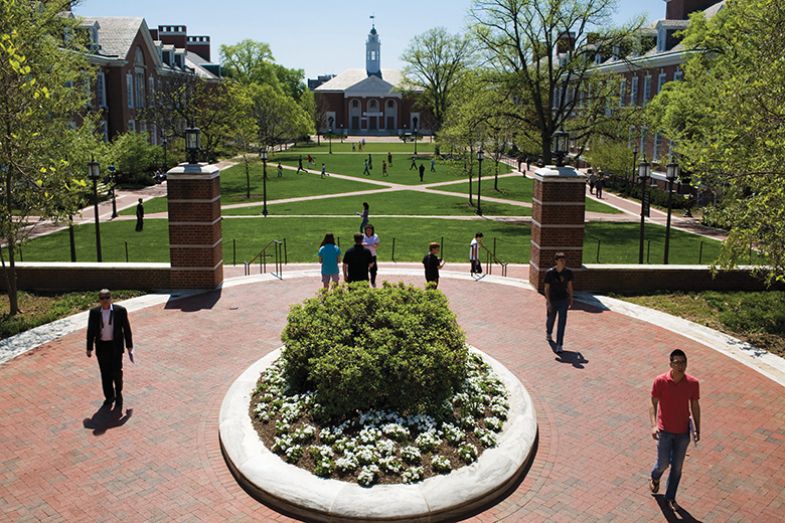
Teaching students to be more tolerant of opposing views is only one part of the solution to “democratic backsliding”. Research is another important avenue. Johns Hopkins has opened a new research institute, named the Agora after the central public spaces in Ancient Greek city states, to investigate the root causes of the threats to democracy and the growing polarisation of American and other Western societies. Scholars within it are seeking to understand the diminishing trust in core democratic institutions such as the media, the judiciary and elected institutions, and whether interventions could be employed to redress the situation.
Daniels’ book outlines other ways leaders can reposition their institutions to better support democracy. For instance, universities must do more to strengthen social mobility, and they must be better stewards of facts and upholders of the value of truth – which includes addressing the reproducibility crisis in research.
All in all, redressing the democratic recession is a tall order, but Daniels is optimistic. “What’s so great about leading a university is how ideas matter,” he says. “If you can get your ideas pitched at a level where people can understand them and see the force of them, then you have every prospect of seeing them have influence.”
Quick facts
Born: Toronto, 1959
Leadership positions: President at Johns Hopkins; provost and professor of law at the University of Pennsylvania; dean and professor of law at the University of Toronto
Academic qualifications: LLM from Yale University; JD from University of Toronto; BA from University of Toronto
Family: Married, has three grown-up children, two are lawyers and one is studying for an MD-PhD
Academic hero: Daniel Coit Gilman, the first president of Johns Hopkins. A visionary leader who “birthed the great American research university”
This is the first in our new series of 50 interviews over 50 weeks with the people running the world’s top universities about how they solve common strategic issues and implement change. Follow the series here.
POSTSCRIPT:
Print headline: Talking leadership: Ron Daniels on the university as a bastion of democracy
Register to continue
Why register?
- Registration is free and only takes a moment
- Once registered, you can read 3 articles a month
- Sign up for our newsletter
Subscribe
Or subscribe for unlimited access to:
- Unlimited access to news, views, insights & reviews
- Digital editions
- Digital access to THE’s university and college rankings analysis
Already registered or a current subscriber?

